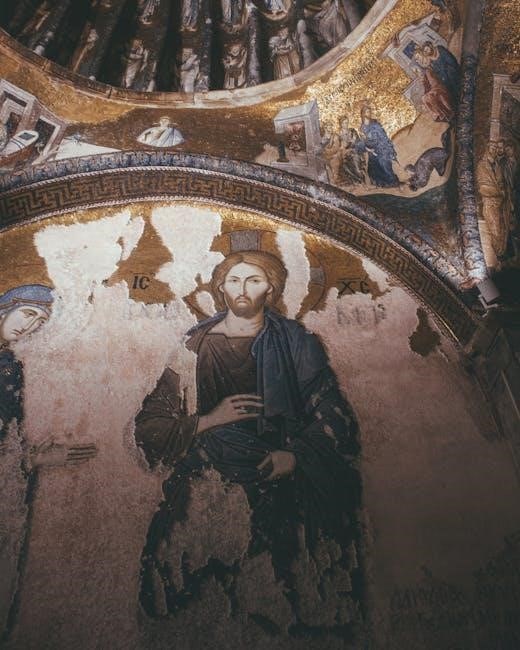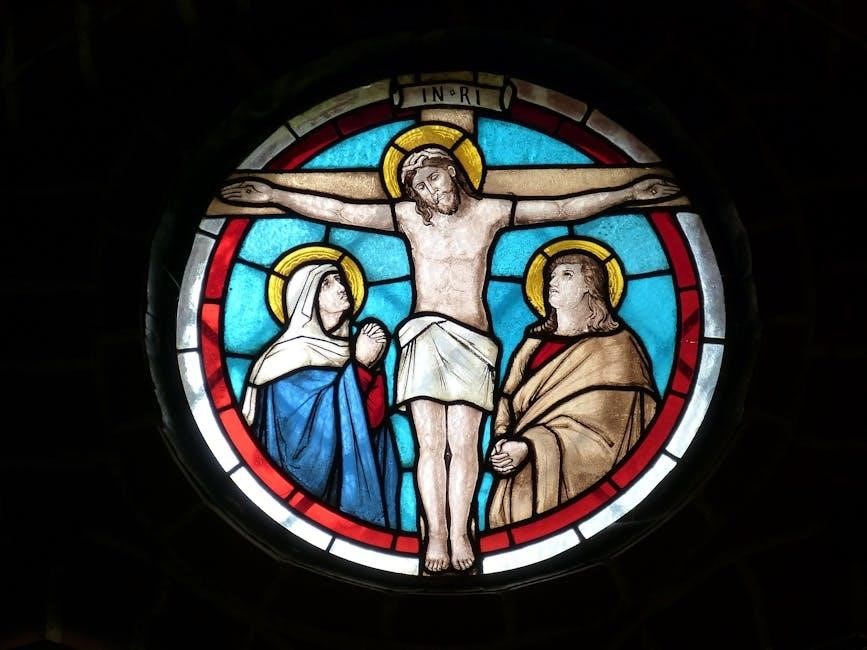The six trials of Jesus, conducted swiftly before Jewish and Roman authorities, highlight the legal and religious tensions surrounding His condemnation. These events, though brief, hold profound significance in Christian history.
Overview of the Trials
The six trials of Jesus, conducted in a single night, were a series of legal proceedings that led to His condemnation. These trials were divided into three Jewish trials (before Annas, Caiaphas, and the Sanhedrin) and three civil trials (before Pontius Pilate, Herod Antipas, and Pilate again). Each trial highlighted the tensions between religious and political authorities, as Jesus faced accusations of blasphemy and treason. Despite the illegality of many proceedings under Jewish and Roman law, the trials culminated in the crucifixion. The rapid sequence of events underscored the predetermined fate of Jesus, as prophesied in Scripture. These trials not only revealed the injustice of the system but also demonstrated Jesus’ steadfast commitment to His divine mission, even in the face of immense opposition and suffering.
The First Jewish Trial: Before Annas
Jesus was first brought before Annas, the former high priest, in an informal trial. Annas questioned Jesus about His teachings and disciples, while Peter denied Jesus nearby (John 18:12-14, 19-23).
John 18:12-14, 19-23
John 18:12-14 describes Jesus’ arrest by the Roman cohort and officers of the Jews, who bound Him and led Him to Annas. In verses 19-23, Annas interrogated Jesus about His disciples and teachings, seeking evidence for charges. Jesus replied, “I spoke openly to the world… why question me?” Emphasizing His public ministry’s transparency, He directed them to ask those who heard Him. Meanwhile, Peter’s denial in the courtyard nearby underscores the tension and fear surrounding the events. This passage highlights the initial stages of Jesus’ trials, blending legal inquiry with personal betrayal, setting the tone for the subsequent proceedings against Him.
The Second Jewish Trial: Before Caiaphas
Jesus was brought before Caiaphas, where the Sanhedrin sought false testimony to condemn Him. Jesus’ declaration of being the Messiah led to charges of blasphemy, accelerating His condemnation.
Matthew 26:57-75; Mark 14:53-72
After His arrest, Jesus was taken to the high priest Caiaphas, where the Sanhedrin assembled. False witnesses testified against Him, but their testimonies were inconsistent. When asked directly by Caiaphas if He was the Christ, Jesus affirmed, “You have said so.” This declaration was deemed blasphemy, leading the council to condemn Him to death. The religious leaders sought to justify their actions under Jewish law, while Jesus remained steadfast in His identity and mission. These passages highlight the legal and religious tensions surrounding Jesus’ trials, emphasizing the rushed and unjust nature of the proceedings.

The Third Jewish Trial: Before the Sanhedrin
The Sanhedrin, gathered at dawn, condemned Jesus for His claims of divinity. This trial, though legally questionable due to its timing and lack of quorum, solidified His fate.
Luke 22:66-71; Matthew 27:1
As morning broke, the Sanhedrin reconvened to interrogate Jesus formally. They asked if He was the Messiah, and His affirmative response sealed His fate. The council deemed His statement blasphemous, leading to a unanimous condemnation. The trial’s legality was questionable, as it occurred at dawn, violating the rule that capital cases required a day’s adjournment. Despite this, the Sanhedrin delivered Jesus to the Romans, seeking crucifixion. The religious leaders’ actions underscored their determination to eliminate Jesus, whom they viewed as a threat to their authority and traditions.

The First Civil Trial: Before Pontius Pilate
Pontius Pilate, the Roman governor, questioned Jesus, finding no fault in Him. Despite recognizing His innocence, Pilate succumbed to the crowd’s pressure, setting the stage for condemnation.
Matthew 27:2, 11-14; John 18:28-38
In Matthew 27:2, Jesus is handed over to Pontius Pilate, the Roman governor, marking the beginning of His civil trials. Pilate questions Jesus, who remains silent, fulfilling prophetic words about endurance under oppression (Matthew 27:11-14). The Roman governor finds no fault in Jesus, yet the Jewish leaders persist in their accusations. In John 18:28-38, Jesus is brought before Pilate, who seeks to understand the charges against Him. Pilate’s wife warns him about Jesus in a dream, adding to his internal conflict. Despite recognizing Jesus’ innocence, Pilate ultimately yields to the crowd’s demand, fearing unrest and potential repercussions from Rome. This trial underscores Pilate’s moral weakness and the political dynamics influencing the trial’s outcome.
The Second Civil Trial: Before Herod Antipas
Herod Antipas, curious about Jesus, questioned Him but found no guilt. Jesus’ silence puzzled Herod, who mocked Him and returned Him to Pilate, deferring judgment.
Luke 23:6-12
Luke 23:6-12 details the second civil trial of Jesus before Herod Antipas. When Pilate learned Jesus was from Galilee, he sent Him to Herod, who was in Jerusalem for the Passover. Herod, curious and hoping to see a miracle, questioned Jesus, but Jesus remained silent. Despite Herod’s mockery and the false accusations, Jesus did not defend Himself. Herod, finding no basis for the charges, ridiculed Jesus and sent Him back to Pilate. This trial highlighted Jesus’ humility and Herod’s reluctance to take responsibility. The exchange between Pilate and Herod ended their prior animosity, showcasing political maneuvering. Jesus’ silence underscored His divine purpose, as He stood firm in the face of injustice. This trial, like the others, demonstrated the collusion of religious and political leaders in condemning an innocent man.
The Third Civil Trial: Before Pontius Pilate Again
Pilate, recognizing Jesus’ innocence, sought to release Him but faced intense pressure from the crowd. Jesus was condemned to crucifixion after Barabbas was chosen over Him.
Matthew 27:15-26; John 19:1-16
In the third civil trial, Pontius Pilate, seeking to appease the crowd, presented Jesus alongside the criminal Barabbas. Despite acknowledging Jesus’ innocence, Pilate succumbed to the crowd’s demand for crucifixion. Matthew 27:15-26 describes how Pilate, after scourging Jesus, offered Him to the people, but they insisted on His death. John 19:1-16 details Pilate’s final interrogation of Jesus, emphasizing His kingship and divine mission. Pilate’s wife warned him about Jesus, reflecting her unease. Ultimately, Pilate, fearing a riot, delivered Jesus to be crucified. This trial underscored the clash between Roman authority and Jewish religious fervor, sealing Jesus’ fate.

Significance of the Six Trials
The six trials of Jesus expose the corruption and injustice of both Jewish and Roman legal systems, while revealing His divine purpose and fulfillment of prophecy.
Legal and Religious Implications
The six trials of Jesus violated Jewish and Roman legal standards, as they were conducted at night and without proper witnesses. These illegal proceedings underscored the corruption of the religious leaders, who sought to eliminate Jesus to maintain their power. The trials also highlighted the fulfillment of prophecies and the divine plan for Jesus’ sacrifice. The Jewish trials focused on religious charges, such as blasphemy, while the Roman trials addressed political accusations, like threatening Caesar’s authority. Pontius Pilate’s recognition of Jesus’ innocence contrasted with the Sanhedrin’s determination to condemn Him. This juxtaposition revealed the clash between justice and religious prejudice, ultimately leading to Jesus’ crucifixion. These events remain central to Christian theology, illustrating the depth of human sin and the redemptive power of His sacrifice.
The six trials of Jesus, marked by injustice and haste, led to His crucifixion, fulfilling prophetic destiny. His steadfastness and sacrifice remain central to Christian faith and redemption.
Reflection on the Trials’ Impact
The six trials of Jesus profoundly shaped Christian theology and history. Despite the unjust proceedings, His unwavering commitment to His mission exemplified divine grace and sacrifice; The trials underscore the clash between religious tradition and spiritual truth, highlighting themes of justice, faith, and redemption. Jesus’ silence and forgiveness during these ordeals revealed His divine nature, offering a powerful message of love and reconciliation. The events serve as a timeless reflection on the human condition, encouraging believers to stand firm in their faith amidst adversity. The trials’ impact remains central to the narrative of salvation, inspiring devotion and hope across generations.
